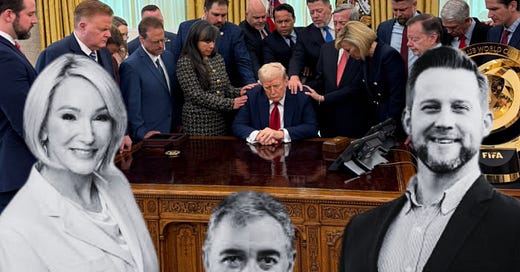On March 19, 2025, the Oval Office hosted a prayer event that stirred the waters of American Christianity. Christian Nationalist leader William Wolfe, a figure lauded by many as theologically sound, joined hands with Paula White, head of the White House Faith Office and a televangelist some decry as heretical, to pray with President Donald Trump. For some, this was a scandal—a faithful servant of God aligning with a prosperity preacher whose teachings clash with orthodox doctrine.
The backlash was swift: How could Wolfe, a stalwart of biblical fidelity, share a platform with White, whose prosperity gospel and past scandals grate against traditional Christian sensibilities?
Yet, Scripture offers a lens that reframes this moment—not as compromise, but as a call. The story of Daniel counseling King Nebuchadnezzar amidst a court of pagan magicians and wise men reveals a timeless truth: Christians are to bring godly wisdom to government leaders, undeterred by the company those leaders keep.
THE CONTROVERSY THAT SHOULD NOT HAVE BEEN
The event itself was a snapshot of Trump’s faith-based agenda. White, a long-time spiritual advisor to the President since 2002, led the prayer session, joined by Wolfe and other faith leaders like Dr. Robert Jeffress. Documented by White House photographer Margo Martin, the gathering saw Trump seated at the Resolute Desk, surrounded by hands raised in supplication—a scene echoing the administration’s push for religious liberty, crystallized by the reestablished White House Faith Office. Wolfe, executive director of the Center for Baptist Leadership and a vocal Christian Nationalist, called it “a huge honor” to pray for Trump, representing a coalition of Baptist leaders committed to biblical principles in public life.
But the harmony ended there. Critics pounced. White’s theology—rooted in prosperity gospel claims that faith yields material blessings—has long drawn fire. Her critics point to her three marriages, alleged financial improprieties, and a 2020 sermon praying for the “miscarriage” of “Satanic pregnancies” (later clarified as metaphorical spiritual warfare). And by “her critics,” I mean me. I’ve written more than one-hundred articles about her heresies at Pulpit & Pen and Protestia over the years.
Some, like Rev. William Barber, brand her a “Christian nationalist” peddling “slaveholder religion.” Wolfe, by contrast, is seen as a bulwark of orthodoxy, advocating a government grounded in Scripture, opposing abortion, no-fault divorce, and LGBTQ rights with a rigor that resonates with conservative evangelicals. To his detractors, his presence with White was a betrayal—a dilution of purity for political proximity.
Justin Peters, whose one-track doctrinal mind has him perpetually riding the hobby horse of Cessationism, took great offense that Wolfe would pray for the president with White in the crowd. One would have thought from Peter’s strong response that Wolfe and White had held hips, swaying back and forth in tongues. Chris Hohnholz, a professional clinger to various Reformed micro-celebrities, seconded Peter’s motion for a scolding.
No doubt, their complaints had far more to do with looking for daily excuses to complain about Christian Nationalism than by serious conviction. Regardless, their complaints betray the inability (or unwillingness) to use Scripture to inform their opinions. When you’re just trying to score points against whoever the Reformed War Lords tell this week you’re supposed to feud with, this is what you get.
This tension isn’t new. Christians have wrestled with how to engage a fallen world without being tainted by it. Yet, the Bible doesn’t leave us guessing. Daniel’s life in Babylon offers a roadmap for navigating such dilemmas, showing that God’s people can—and must—counsel leaders, even when those leaders lean on flawed advisors.
DANIEL IN BABYLON
Daniel’s story begins with exile. Taken captive to Babylon after Jerusalem’s fall (Daniel 1:1-6), he served in the court of Nebuchadnezzar, a pagan king whose empire thrived on idolatry and conquest. By chapter 2, Nebuchadnezzar faces a crisis: a troubling dream he can’t recall, let alone interpret. He summons his “magicians, enchanters, sorcerers, and Chaldeans” (Daniel 2:2)—a motley crew of occultists and wise men steeped in Babylonian mysticism. Their failure to deliver enrages the king, who decrees their execution (Daniel 2:12-13). Enter Daniel, a young Hebrew who steps into this chaos with a different spirit.
Daniel doesn’t recoil from the king’s reliance on pagans. He doesn’t demand Nebuchadnezzar purge his court of false counselors before offering help. Instead, he seeks God’s mercy (Daniel 2:18), receives the dream’s revelation (Daniel 2:19-23), and boldly approaches the king. “Do not destroy the wise men of Babylon,” he pleads (Daniel 2:24), then delivers the interpretation: a vision of kingdoms rising and falling, culminating in God’s eternal reign (Daniel 2:36-45). Nebuchadnezzar marvels, proclaiming, “Truly, your God is God of gods” (Daniel 2:47), and elevates Daniel to rule over Babylon’s wise men.
This pattern repeats. In Daniel 4, Nebuchadnezzar dreams again—a tree felled by divine decree. His magicians falter, but Daniel interprets it as a warning of the king’s coming humiliation, urging, “Break off your sins by practicing righteousness” (Daniel 4:27). Though the king ignores him, God’s judgment falls, and Nebuchadnezzar later praises God (Daniel 4:34-37). In Daniel 5, Belshazzar, Nebuchadnezzar’s successor, turns to Daniel amidst his own mystics to read the writing on the wall, and Daniel fearlessly declares judgment (Daniel 5:25-30).
What’s striking? Daniel never boycotts the court because of its sorcerers. He serves alongside them, outshining their folly with God’s wisdom. He doesn’t compromise his faith—refusing defiled food (Daniel 1:8) or idol worship (Daniel 6)—but he doesn’t withdraw either. He engages, trusting God to use him in a pagan system.
APPLYING THE EXAMPLE OF DANIEL
William Wolfe’s prayer with Paula White mirrors Daniel’s stance. Trump, like Nebuchadnezzar, is a leader consulting a mixed bag of advisors. White’s prosperity theology may clash with Wolfe’s Reformed convictions, much as Babylon’s magicians clashed with Daniel’s monotheism. Some Christians see White as a modern “enchanter”—peddling a gospel of wealth over repentance (as I do). Wolfe, with his call for biblical governance, stands apart, akin to Daniel’s reliance on divine revelation. Yet, both were in the Oval Office, praying for a leader navigating a nation in crisis.
Should Wolfe have stayed away? Daniel’s example says no. Nebuchadnezzar’s court was a spiritual cesspool—divination, idolatry, pride—yet God placed Daniel there to speak truth. The king didn’t ditch his magicians; Daniel didn’t need him to. He offered counsel anyway, trusting God to sort the wheat from the chaff. Wolfe’s critics might argue White’s presence taints the effort, but Daniel didn’t let the Chaldeans’ errors stop him. He knew his role: deliver God’s word, not police the king’s guest list.
Scripture supports this. Proverbs 11:14 says, “Where there is no guidance, a people falls, but in an abundance of counselors there is safety.” Leaders need wisdom, even from competing voices. Paul, in Romans 13:1-4, calls governing authorities “God’s servants,” tasked with justice—a mandate Christians can shape. Jeremiah 29:7 urges exiles, “Seek the welfare of the city where I have sent you… pray to the Lord on its behalf.” Wolfe’s prayer aligns with this—interceding for a nation, despite imperfect company.
AMERICA’S NEED FOR GODLY INFLUENCE
Why does this matter? America, like Babylon, teeters on moral cliffs—abortion, sexual confusion, family breakdown. Christian Nationalists like Wolfe see a divine mandate to reclaim godly principles in law, echoing Deuteronomy 28’s blessings for obedience. White’s supporters might frame it as spiritual warfare, claiming victory over secularism. Both want influence; both see Trump as a conduit. But the Oval Office isn’t a church—it’s a battleground of ideas. Refusing to engage because of White risks ceding ground to worse voices—atheists, relativists, or opportunists with no fear of God.
Daniel’s counsel saved lives (Daniel 2:24) and pointed kings to God (Daniel 4:37). Wolfe’s presence could do the same—steering policy toward righteousness, even if White’s prayers veer off course. Nebuchadnezzar didn’t convert overnight; Trump may not either. But Daniel’s persistence bore fruit, and Christians today must trust God’s sovereignty over outcomes.
ADDRESSING THE CRITICS
Of course, it’s easy for men who would never be asked to provide counsel or prayer to the President of the United States to cast accusations and jealous scowls toward those who are. Pettiness and bitterness is part and parcel to the evangelical experience, after all. And so is loudly flaunting your virtue of being above reproach and un-compromised. When “uncompromised” is your entire brand, as it is the pietists like Peters and his particular G3 brand of religion, it makes no difference that uselessness often accompanies the uncompromised merit badge.
Hopefully the upset over Wolfe and White stems from a valid concern: purity matters. Jesus warned of false prophets (Matthew 7:15), and Paul condemned “another gospel” (Galatians 1:8). White’s critics (including me) see her as a theological loose cannon—her “Satanic pregnancies” remark and jet-buying past fuel the fire. Associating with her risks endorsing error, they say, citing 2 Corinthians 6:14: “Do not be unequally yoked with unbelievers.”
But Daniel wasn’t yoked to magicians—he outranked them (Daniel 2:48). Wolfe isn’t preaching White’s sermons; he’s praying for a leader. The yoke is with God, not man. Jesus ate with sinners (Luke 5:30-32), not to affirm sin but to call them out. Wolfe’s critics might prefer isolation, but 1 Corinthians 5:9-10 clarifies: “I did not mean [avoid] the sexually immoral of this world… since then you would need to go out of the world.” Engagement isn’t endorsement—it’s mission.
CHRISTIANS AND THE PUBLIC SQUARE
This isn’t about Wolfe or White—it’s about the Church’s role. Daniel’s exile wasn’t optional; neither is ours. America’s not Babylon, but it’s not Zion either. Leaders will always consult a cacophony—lobbyists, ideologues, charlatans. Christians can’t control that, but they can compete. If godly voices retreat, who fills the void?
Trump’s Faith Office, launched February 7, 2025, aims to bolster religious liberty—a cause Wolfe champions. White’s leadership may rankle, but Daniel didn’t quit over sorcerers. He stayed, spoke, and shaped history. Wolfe’s prayer could nudge policy—on life, family, freedom—toward God’s will, even if White’s theology muddies the waters. God used Balaam’s donkey (Numbers 22); He can use imperfect vessels.
The Oval Office prayer wasn’t a theological summit—it was a moment of influence. Wolfe’s critics fear contamination, but Daniel feared God more than man. Christians are called to be salt and light (Matthew 5:13-16), not hermits. Criminalizing homosexuality isn’t yet on the table (we can always dream), but guiding a nation toward righteousness is. Wolfe’s choice reflects Daniel’s: counsel the king, trust God with the rest. Society’s best interest lies not in retreat, but in bold, faithful presence—magicians, heretics, and all.
So far as the Christian Nationalists go, the complaints that Wolfe received today is just one more reason not to give a second hearing to those who do nothing but rebuke the men in the arena. Let them applaud or cheer from the cheap seats, leading a bitter band of irrelevant clingers-on who insist that faithfulness requires us to forfeit Christ’s place in public square.
If you appreciate my work, grab a paid subscription to access exclusive content (and a bunch of other perks) for only $8 a month or $80 a year.
If you don’t want a subscription, please consider a one-time gift by clicking the ‘coffee link’ below. This is one of the things I do to provide for my small farm and big family, so I sure appreciate it.



















Share this post